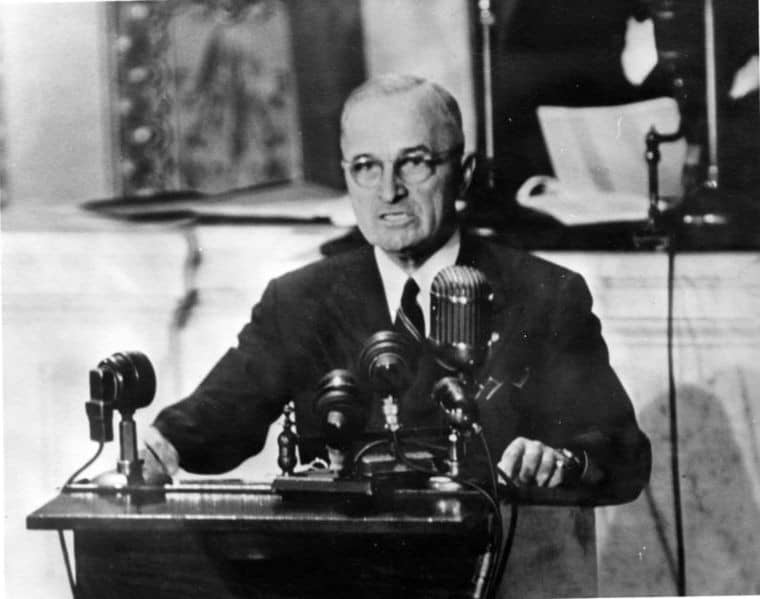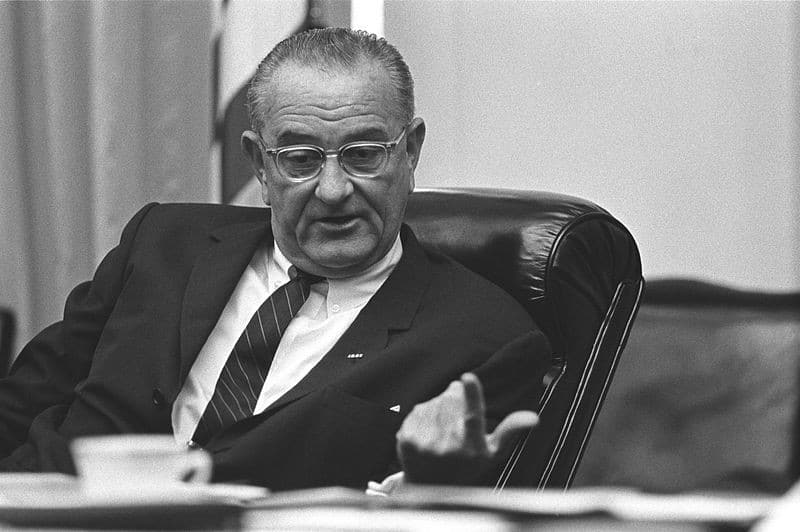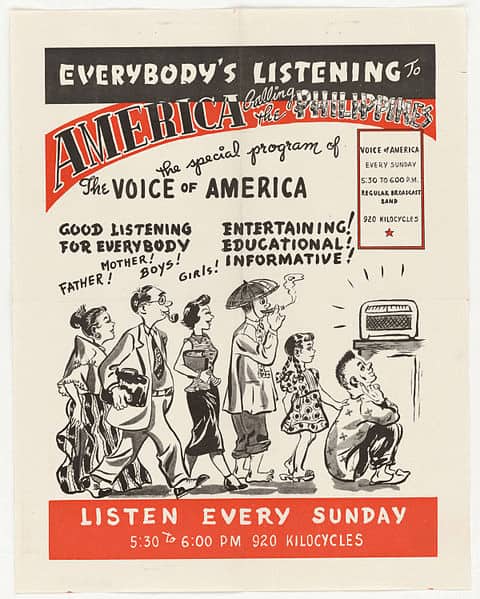
Journalist Euguene F. Karst knew the importance of words. He personally witnessed how communication could highlight the opinions of little known Russian farmers but also lead to embarrassing misunderstandings for the President of the United States. Through the Office of War Information, Voice of America, and other reporting, Karst worked to spread the principles and spirit of America to audiences in the U.S. and abroad. His recollections provide a candid behind the scenes look at diplomacy and the news.
Voice of America (VOA) originated as part of the Office of War Information. VOA began airing in 1942 to combat Nazi propoganda and continues to produce programming on U.S. ways of life, culture, economics, and politics to countries around the world. It has played an important role in influencing public opinion abroad regarding U.S. policy, although some view it as a source of American propaganda. Karst experienced the difficulties of transmitting VOA programs to an audience in the Soviet Union. This long-standing problem was intensified in 2017 when Russia’s Justice Ministry labeled Voice of America as a foreign agent.
Karst worked for USIS (United States Information Service) for the majority of his career.
He writes about creating programming for foreign audiences in Indonesia, the Middle East, and Europe. In Argentina, he published a USIS magazine, Informaciones, to counter an Anti-American campaign by Juan Perón and Evita. Later in his career, Karst worked in the Latin America Division of the Voice of America.
Eugene F. Karst was initially interviewed on December 9, 1999.
Read ’s Eugene F. Karst full memoir HERE and another moment about broadcasting and the Foreign Service HERE.
Drafted by Wendy Erickson.
Excerpts:
“Truman never claimed to be a great orator.”
Truman’s First Speech: Later I transferred to another section of the OWI [Office of War Information], the news office. There we processed news material intended for use by newspapers in the Pacific area. I was in this section when Franklin Roosevelt died and I prepared special materials about his unexpected death. A short time later, Truman made his first speech to the American people and for other nations. The wire copy coming off the teletype machines showed an exclamation point after EVERY sentence. I believe somebody in the White House had done this so that when the President read the speech over the radio, he would not drop his voice at the end of each sentence. Truman never claimed to be a great orator.
“So the United Press and the Scripps-Howard news services accused the State Department of trying to kill a key part of the MacArthur statement. Naturally, I was called on the carpet.”
Blamed for an Omission: When the OWI and the Coordinator of Interamerican Affairs office disappeared after the end of the war, the need to present America’s message to the world was recognized. A general news office was set up for dissemination throughout the world, but there was a need for specialized area coverage, so one section devoted itself to matters of interest in Europe and the Middle East. I was given the responsibility for supervising about two or three hours daily to be sent to the Far East.
You may recall that General MacArthur had his own ideas about Far Eastern affairs, often different from Truman’s, which finally resulted in Truman firing MacArthur. But before this came about, I became involved in an incident where we were accused of deliberately editing out a key sentence of a MacArthur statement which ran about 2,000 words.
By then we had an office in Shanghai and elsewhere. The U.S. Information Office in Shanghai put my 600-word story out to newspapers and radio stations. A very strong statement by MacArthur, one sentence, was NOT included. So the United Press and the Scripps-Howard news services accused the State Department of trying to kill a key part of the MacArthur statement. Naturally, I was called on the carpet. I had worked for the government for so many years by then that I knew my job was to handle news writing without any personal views of my own. I KNEW I had NOT tried to distort MacArthur’s message. So I trotted out my original typewritten story which included the statement in question.
“The villain was tracked down to their Manila office.”
The “wire room” included several teletype machines for incoming and outgoing material. The State Department had a contract with an independent, private company called “Press Wireless.” It owned the teletype machine handling all of the Far Eastern Wireless File material. It was their job to send my material to San Francisco by landline. There the Press Wireless people eventually put the material into Morse code and transmitted it to all points in the Far East, including Shanghai, Tokyo, Hong Kong, and wherever.
But, in Manila it had an office where all this material was received and re-transmitted after editing it for garbles or mistakes. The villain was tracked down to their Manila office. It seemed probable that a clerk, possibly one who could follow letter-by-letter material without knowing any English, was the one responsible. I was exonerated because I showed my superiors the original story I wrote and also was able to show them the teletype tape which included the key sentence. So it was a case of probably an innocent error by the employee of a private company, and certainly nobody employed by the State Department.
“. . . the whole program was jammed as usual, including all the remarks by the Russian farm group.”
Voice of America and the Soviet Union: Back in Washington, I had a tour of duty in the Special Events section of the Voice of America. One day we received a tip from the Russian Desk of the State Department. The Soviet Union had sent a delegation of Russian farmers to the United States, visiting Iowa and other agricultural areas. Now they were back in Washington before heading home.
Some months earlier, Leonard Marks, chief of USIA, in response to a query, said that the Voice of America would freely broadcast the views of Russians and others in any discussion of communism versus the American views on world affairs. Meanwhile, the USSR was consistently jamming Voice programs in Russian, beamed at Russia.
Somebody in the Russian embassy recalled Marks’ statement and phoned the State Department asking whether the Voice of America would broadcast the views, uncensored, of the Russian farm group. The State Department phoned USIA and soon I received instructions to get tape recording equipment over to the Russian embassy for the interviews. So, off we went, I as producer and another man with the recording equipment. The Russian farm group voiced their views freely, in Russian, which I did not speak. Later it was broadcast, uncut, in our program beamed at the Soviet Union. Interestingly, the whole program was jammed as usual, including all the remarks by the Russian farm group.
A sidelight of all this was the fact that I, and the man who recorded the Russians, were the first American government employees below the ambassadorial level ever to step inside the Russian embassy on Sixteenth Street in Washington.
“How could the President of the United States make such a gaffe?”

A Texas Joke: Now, with Lyndon Johnson as president, I wanted my own personal assessment of him. As chief of the Latin American division, I could decide who might “cover” various assignments. Johnson decided to invite the Latin American ambassadors resident in Washington to the White House for an informal get-acquainted session. Here was my chance. So I and an engineer made arrangements to record the gathering at the White House.
LBJ stumbled through a brief written talk of about five minutes in length, welcoming the visitors. Then, so help me, he said, “Gentlemen, let’s all go into the East Room and we’ll have a cup of tea.” Remember that coffee is the principal crop and money-maker for countries like Colombia, Guatemala, El Salvador, Costa Rica, and Ecuador. It is a vital force in the economy of countries like Brazil, Mexico, and possibly one or two others.
I was shocked. I was not close enough to the group to see or hear any reaction on the part of the ambassadors. How could the President of the United States make such a gaffe? Was it thoughtless? Or could it be intentional, his idea of a Texas joke? Back at the office, I was soon involved in other matters and forgot the incident. But, through the years, I have wondered. Since then I have read great quantities of biographical material on Lyndon Johnson and as of 1999 I am inclined to believe that it was his idea of a joke, probably a clumsy but certainly undiplomatic bit of humor.
“It was a completely ridiculous request that I, a foreigner, in Argentina, should ask the local photographers to leave.”
Taking a Free Tour: Which reminds me of an experience I had in Buenos Aires when I was information officer there some years previously. A big congressional delegation came to town. Argentine as well as American embassy officials were all out at the airport to greet them. After 10 minutes or so, a member of the delegation came to me and asked me to request that the photographers leave the airport. Remember, these were Argentine news photographers and I, as a member of the American embassy, really was a guest in the country. It was a completely ridiculous request that I, a foreigner, in Argentina, should ask the local photographers to leave.
The answer to the whole thing was that, still on the plane waiting to disembark, were seven or eight wives of the delegation, all traveling on an American military plane. What they feared was that some newsman might tell about the wives getting a free tour of South America and the story would get back to their home-town newspapers or perhaps in Drew Pearson’s column.
TABLE OF CONTENTS
Joined USIA 1942
Office of War Information World War II
Manila, Philippines—USIS, Information Officer 1949-1950
Buenos Aires, Argentina—USIS, Information Officer 1950-1952
Rio de Janeiro, Brazil—USIS, Deputy Public Affairs Officer 1960-1962
Washington, D.C.—USIA, VOA Latin America Division Chief 1962-1965
Retirement ~1969

